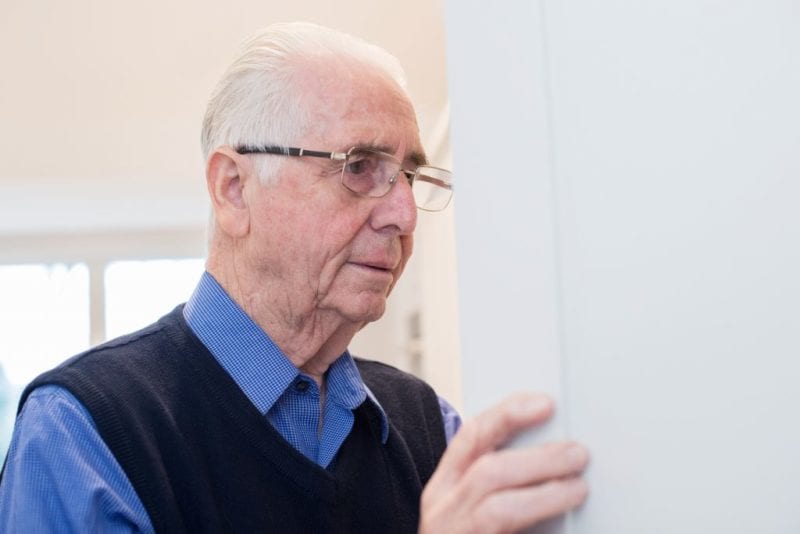Body and mind: how physiotherapy can help seniors with dementia
As defined by Dementia Australia, dementia describes a collection of symptoms that are caused by disorders affecting the brain – thinking, behaviour and the ability to perform everyday tasks.
At The Physio Co (TPC), our most effective treatment comes in the form of functional, multi-activity exercises that reflect a person’s lifestyle, passions and hobbies.
It is so important we know the person; what did they do for work? Which sports do they love? Which footy team do they barrack for? If we can divulge personal information by talking to them and their family – or picking up on clues – we can build a picture of what their life has been.
Finding the sweet spot
A lovely old Irishman by the name of Gerry lived in an aged care facility and used to wear a tartan flat cap with a pom-pom on top. So our physio Robyn took a golf putter in one day and set up a putt-putt course. All of a sudden, a number of folks who were not very mobile got up and started moving. Things became pretty competitive!
Another lady picked up the putter and practised a full backswing! The club obviously triggered something.
Often, dementia sufferers lose recent memory but retain early memories – sometimes even childhood memories. So a prop such as a putter, or a badminton racquet or even a song can get the synapses going and get the body moving.
Come on Eileen!
 Another woman, named Eileen, was in great physical condition, but she was no longer able to talk and had lost a lot of cognitive function. TPC Physio, Robyn, would walk with her and play Come on Eileen by Dexys Midnight Runners on her phone. On hearing the first few bars, Eileen would light up. Her often expressionless face would break into the biggest, cheekiest smile. She would get the giggles and get her groove on. Dancing is so good for strength and balance!
Another woman, named Eileen, was in great physical condition, but she was no longer able to talk and had lost a lot of cognitive function. TPC Physio, Robyn, would walk with her and play Come on Eileen by Dexys Midnight Runners on her phone. On hearing the first few bars, Eileen would light up. Her often expressionless face would break into the biggest, cheekiest smile. She would get the giggles and get her groove on. Dancing is so good for strength and balance!
We love to see Australian seniors getting joy out of life. And by understanding the person we can build familiarity and create a bond, which helps to break down any resistance or negative associations and perceptions.
Non-structured exercise, such as dancing and sport provides an opportunity for dementia sufferers to rediscover themselves and sometimes find new capacity.
Physiotherapy helps to maintain strength, fitness and endurance, as well as balance, contributing to an improved overall quality of life – keeping seniors mobile, safe and happy. There is evidence to suggest that physiotherapy, even something as simple as gentle massage and facilitated relaxation sessions can help to manage symptoms and cognitive decline.
Treating injury or stiffness
In the case of specific injury or pain, it is super-important that physiotherapists and healthcare workers consider the verbal and non-verbal ways that senior clients with dementia might be communicating that they are in pain.
There are different types of dementia and different tolerance levels to pain, but pain receptors are the same for everybody. We have to consider the stage of disease, age and previous injuries during our work with people experiencing dementia.
In the case of a senior person with dementia who isn’t able to speak, our physios will assess them using touch, palpation, strength and observation of movement and function. We will assess the whole body and look out for the hallmarks of distress such as flinching, guarding, vocalising or grimacing. Rigid muscles and severe stiffness are not uncommon and muscles can respond to being injured in many different ways. We do not want to cause any further discomfort or create any link between treatment and pain.
Everybody on the ticket
As cognitive function in an older person declines, it usually gets harder for them to follow their physiotherapy or exercise program. At that point, a person’s support network (that is, family / friends / carers, etc ) can help the person get their important exercise program done in between physiotherapy sessions to help them stay as mobile, safe and happy as possible.
Alongside a trusted medical team, having a person’s friends and families understanding the condition and how they can help from early onset of dementia can make a huge difference to the life and happiness of a senior client.
Interested in knowing more?
Please call on 1300 797 793 or email [email protected] 🙂



 1300 797 793
1300 797 793